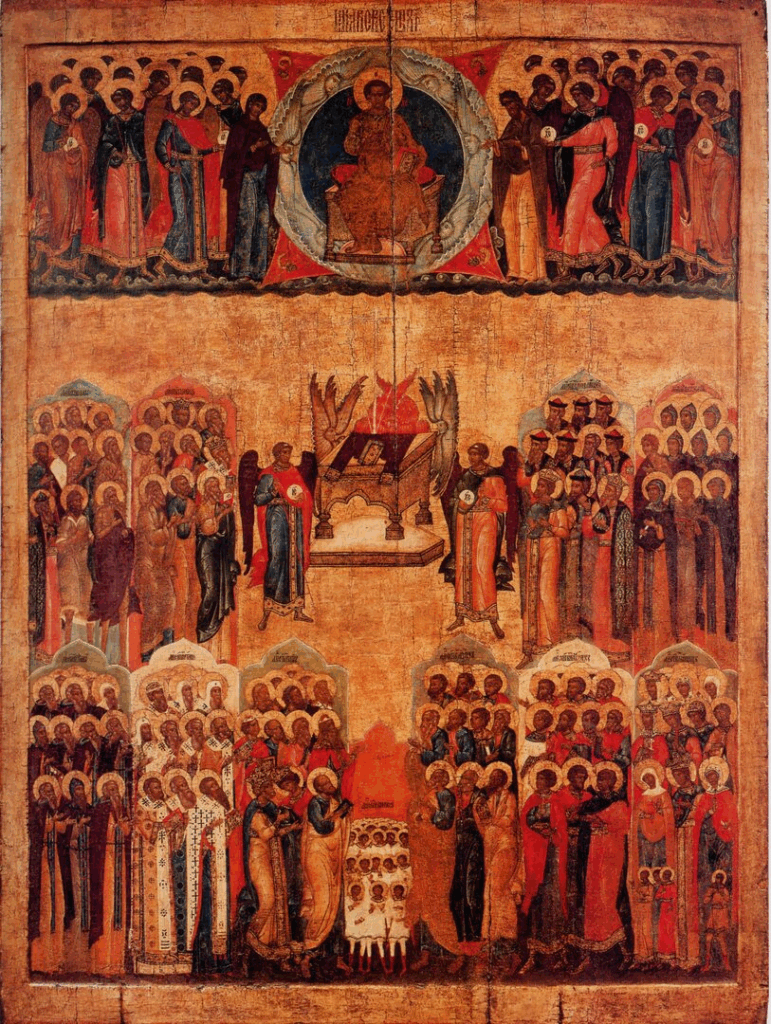About the Sunday of All Saints

In antiquity, it was customary to commemorate all the martyrs for the faith of Christ—both those known and those whose names were forgotten. This commemoration was observed on various days throughout the year in different local Churches. The custom of celebrating it on the Sunday following the Feast of Pentecost was originally a practice unique to Constantinople. Over time, however, this day was established as a common feast for the entire Orthodox Church, and to the remembrance of the martyrs was added the commemoration of all who had in any way pleased God. In this transformed form, the feast acquired a clear theological meaning.
The Apostle Paul once wrote with great feeling to the Christians of Corinth: “Know ye not that ye are the temple of God, and that the Spirit of God dwelleth in you?” (1 Corinthians 3:16). The saints are those who fully grasped this truth and bore it within themselves until their final breath. Some came to this awareness in youth, others even in childhood, and some not until adulthood—or even old age. Some glorified God by the labors of their whole long life, such as St. Anthony the Great or St. Sergius of Radonezh. Others, like the comic actor Ardalion—who had been assigned to mock the Christian martyrs on stage—were suddenly illumined by faith, glorified Christ with all their heart, and were tortured to death. They are like the laborers in the vineyard from the Gospel parable: some worked from early morning, others only the final hour, but each received the same reward according to the grace of the Master (Matthew 20:1–16).
All of these are the vindication of mankind, intercessors for its salvation, and examples for each of us. The prayers of the saints for us, and our imitation of their example—this is the very reason why each Christian is given the name of a saint at baptism. But if, having received such a name, we go through our whole life never once reflecting on why it was given, then that purpose is not fulfilled.
Let our names be to us a constant reminder that, while living on earth, we are called to bear witness—in thought, word, and deed—that we are the children of God, called to receive Him into ourselves, to become a new creation. The lives of the saints show that this is possible even at the very end of life. Therefore, even if we have lived many years in neglect of the soul, we must not despair. The call of God to mankind—“Be ye holy, for I am holy” (Leviticus 11:44; 19:2; 20:7; Amos 3:3; 1 Peter 1:16)—continues to resound for each of us until the final day of our life on earth.
The Feast of All Saints aims to honor all those who have truly loved God—those of old, those of today, and those yet to come—from the earliest days of humanity to the very day of Christ’s Second Coming, including those whose deeds and even names remain unknown to mankind, yet known to God. Nikephoros Kallistos Xanthopoulos, in the synaxarion for the feast, recounts that its widespread celebration arose from the following event:
Emperor Leo the Wise, who reigned in Byzantium in the 10th century, after the death of his wife Empress Theophano—known for her piety, God-fearing nature, and good works—wished to build a great church in Constantinople in her honor. But the hierarchs of the Church did not permit this, as too little time had passed since her death and there was yet no clear testimony that Theophano had received eternal glory from God. Then the emperor asked that the church be dedicated to All Saints, saying that if Theophano were truly among the saints, then let her also be included in their number. His request was granted. The date of this church’s feast entered into the liturgical rubrics of the Church, gradually became universal, and now for nearly two thousand years has inspired the faithful—reminding them of the true goal of the Christian calling.
At Great Vespers, at the Litia, Stichera — Tone 2
Come, all ye of spiritual mind, let us rejoice in the commemoration of the saints! For behold, it has arrived, bringing us rich gifts. Therefore, with voices of gladness and with a pure conscience let us cry aloud, saying:
Rejoice, assembly of prophets, who proclaimed to the world the coming of Christ, foreseeing from afar as though it were near.
Rejoice, ranks of apostles, fishers of the nations and catchers of men.
Rejoice, company of martyrs, gathered from the ends of the earth into one faith, who endured torments and afflictions for its sake and finally received the crown of suffering.
Rejoice, chiefs among the fathers, who wasted your bodies with fasting, and mortified the passions of the flesh, fixing your minds with divine longing, soaring to the heavens, and dwelling with the angels, receiving the eternal good things.
But ye, O prophets, apostles, martyrs, and ascetics, fervently entreat Him who hath crowned you, that those who keep your honorable memory in faith and love may be delivered from visible and invisible enemies.
Tone 4
Angels in heaven and men on earth, having gathered together today, let us all praise the memory of all the saints. For a robe woven from the wisdom on high—adorned with the blood of martyrs and the sweat of ascetics—has blossomed like a purple garment woven of fine linen and has shone forth with radiance.
Therefore, O Christ, Thy Churches, adorned by them, cry out unto Thee for their sake:
Grant unto us great mercy.